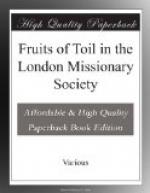[Illustration: Bangalore institution.]
In the direct religious teaching of the people, nearly six hundred missionaries from Europe and America, sustained by twenty-two Missionary Societies, have planted stations in the most populous and influential cities. Joined by two hundred ordained Native Ministers and two thousand Native Preachers, they carry on a system of christian agency which costs the important sum of 300,000 pounds sterling a year. Many calumnies have been uttered respecting missionaries, and their work, by men who have professed to visit the cities where they labour, and saw nothing of its results. But these are more than answered by the striking fact that, of the money annually expended on these Missions no less than 50,000 pounds are contributed by the English residents in India, who live among the missions and see them with their own eyes.
And what is the result? We can point to 50,000 adult communicants, to congregations of 250,000 people, and to our two hundred native clergy, as fruits of grace and proofs of blessing from above. But one of the greatest fruits of all missionary labour in India in the past and in the present is to be found in the mighty change already produced in the knowledge and convictions of the people at large. Everywhere the Hindoos are learning that an idol is nothing, and that bathing in the Ganges cannot cleanse away sin. Everywhere they are getting to know that to us there is one God, even the Father, and one Lord Jesus Christ, the Saviour of all nations. A native scholar, speaking of his own religion, has said of it, “Hindooism is sick unto death: I am persuaded it must fall.”
A crowd once asked a Berlin missionary, “Sir, why does not the Government abolish Juggernaut, and save us from the penalties of outcasts if we profess Christianity?” While the new school of educated men, calling themselves Theists, in myriads are seeking for a better way, without encountering the same great penalties. A glorious future is indicated by these “signs of the heaven,” which seem to me to prove that in a great Empire in which public opinion is compact and firm, a vast change in preparation for the future may be produced while churches and converts are comparatively few. Like Israel of old in presence of Moab, in the darkness of night we have been digging ditches by Divine command; but when His day of grace shall dawn and the morning sacrifice be offered, He shall fill them in abundance with His Spirit’s streams, and the whole Empire be revived.




